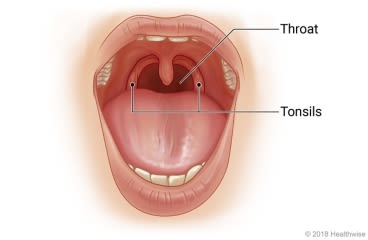
Why is this test done?
A throat culture may be done to:
- Find the cause of a sore throat. Most sore throat infections are caused by a virus. A throat culture shows the difference between a bacterial infection and a viral infection. This can help guide treatment.
- Check a person who may not have any symptoms of infection but who carries bacteria that can spread to others. This person is called a carrier.
How do you prepare for the test?
- In general, there's nothing you have to do before this test, unless your doctor tells you to.
- Tell your doctor if you have recently taken any antibiotics.
How is the test done?
- You will be asked to tilt your head back and open your mouth as wide as you can.
- Your doctor will press your tongue down with a flat stick (tongue depressor) and then examine your mouth and throat.
- A clean cotton swab will be rubbed over the back of your throat, around your tonsils, and over any red areas or sores to collect a sample.
- The sample may also be collected using a throat washout. For this test, you will gargle a small amount of salt water and then spit the fluid into a clean cup. This method gives a larger sample than a throat swab. It may make the culture more reliable.
What happens after the test?
- Results for a rapid strep test are available in 10 to 15 minutes. This test is only for bacterial infections caused by strep bacteria. This is the most common type of throat culture.
- Other throat culture test results for bacterial infections are ready in 1 to 2 days, depending on which bacteria are being tested for. Test results for a fungus may take about 7 days.
When should you call for help?
Call your doctor now or seek immediate medical care if:
- You have a new or higher fever
- You have a fever with a stiff neck or severe headache.
- You have new or worse trouble swallowing.
- Your sore throat gets much worse on one side.
Watch closely for changes in your health, and be sure to contact your doctor if:
- You do not start to feel better after 2 days (48 hours).
- You do not get better as expected.
Follow-up care is a key part of your treatment and safety. Be sure to make and go to all appointments, and call your doctor if you are having problems. It's also a good idea to keep a list of the medicines you take. Ask your doctor when you can expect to have your test results.
Where can you learn more?
Go to http://www.healthwise.net/patientEd
Enter K468 in the search box to learn more about "Throat Culture: About This Test".
Current as of: April 30, 2024
Author: Ignite Healthwise, LLC Staff
Clinical Review Board
All Ignite Healthwise, LLC education is reviewed by a team that includes physicians, nurses, advanced practitioners, registered dieticians, and other healthcare professionals.

